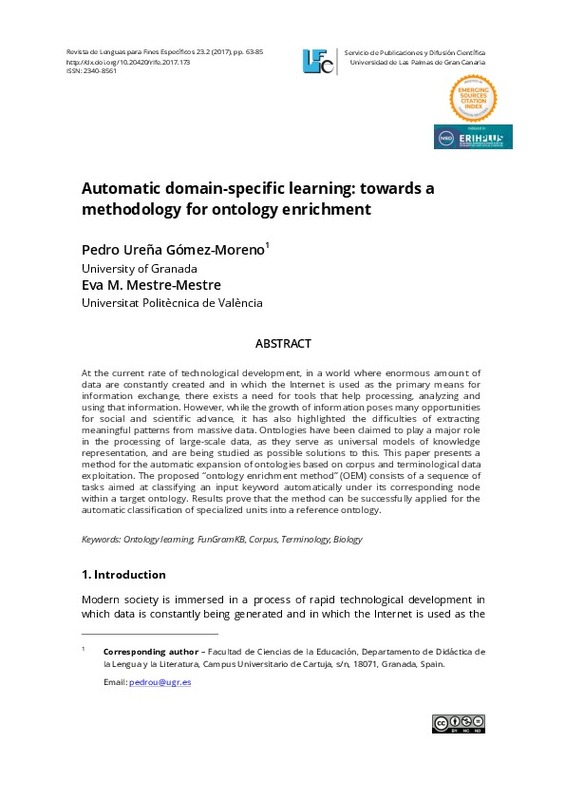JavaScript is disabled for your browser. Some features of this site may not work without it.
Buscar en RiuNet
Listar
Mi cuenta
Estadísticas
Ayuda RiuNet
Admin. UPV
Automatic domain-specific learning: towards a methodology for ontology enrichment
Mostrar el registro sencillo del ítem
Ficheros en el ítem
| dc.contributor.author | Ureña Gómez-Moreno, Pedro
|
es_ES |
| dc.contributor.author | Mestre-Mestre, Eva M.
|
es_ES |
| dc.date.accessioned | 2020-07-21T03:31:08Z | |
| dc.date.available | 2020-07-21T03:31:08Z | |
| dc.date.issued | 2017-12-05 | es_ES |
| dc.identifier.issn | 1133-1127 | es_ES |
| dc.identifier.uri | http://hdl.handle.net/10251/148357 | |
| dc.description.abstract | [EN] At the current rate of technological development, in a world where enormous amount of data are constantly created and in which the Internet is used as the primary means for information exchange, there exists a need for tools that help processing, analyzing and using that information. However, while the growth of information poses many opportunities for social and scientific advance, it has also highlighted the difficulties of extracting meaningful patterns from massive data. Ontologies have been claimed to play a major role in the processing of large-scale data, as they serve as universal models of knowledge representation, and are being studied as possible solutions to this. This paper presents a method for the automatic expansion of ontologies based on corpus and terminological data exploitation. The proposed ¿ontology enrichment method¿ (OEM) consists of a sequence of tasks aimed at classifying an input keyword automatically under its corresponding node within a target ontology. Results prove that the method can be successfully applied for the automatic classification of specialized units into a reference ontology. | es_ES |
| dc.description.sponsorship | Financial support for this research has been provided by the DGI, Spanish Ministry of Education and Science, grant FFI2011-29798-C0201. | es_ES |
| dc.language | Inglés | es_ES |
| dc.publisher | Serv. Publicaciones de la Universidad de Las Palmas de Gran Canaria | es_ES |
| dc.relation.ispartof | LFE. Revista de Lenguas para Fines Específicos | es_ES |
| dc.rights | Reconocimiento - No comercial - Sin obra derivada (by-nc-nd) | es_ES |
| dc.subject | Ontology learning | es_ES |
| dc.subject | FunGramKB | es_ES |
| dc.subject | Corpus | es_ES |
| dc.subject | Terminology | es_ES |
| dc.subject | Biology | es_ES |
| dc.subject.classification | FILOLOGIA INGLESA | es_ES |
| dc.title | Automatic domain-specific learning: towards a methodology for ontology enrichment | es_ES |
| dc.type | Artículo | es_ES |
| dc.relation.projectID | info:eu-repo/grantAgreement/MICINN//FFI2011-29798-C02-01/ES/DESARROLLO DE UN SISTEMA DE REPRESENTACION SEMANTICO-CONCEPTUAL Y SU IMPLEMENTACION EN UN ALGORITMO DE ENLACE BIDIRECCIONAL SINTAXIS-SEMANTICA/ | es_ES |
| dc.rights.accessRights | Abierto | es_ES |
| dc.contributor.affiliation | Universitat Politècnica de València. Departamento de Lingüística Aplicada - Departament de Lingüística Aplicada | es_ES |
| dc.description.bibliographicCitation | Ureña Gómez-Moreno, P.; Mestre-Mestre, EM. (2017). Automatic domain-specific learning: towards a methodology for ontology enrichment. LFE. Revista de Lenguas para Fines Específicos. 23(2):63-85. http://hdl.handle.net/10251/148357 | es_ES |
| dc.description.accrualMethod | S | es_ES |
| dc.relation.publisherversion | https://ojsspdc.ulpgc.es/ojs/index.php/LFE/article/view/919 | es_ES |
| dc.description.upvformatpinicio | 63 | es_ES |
| dc.description.upvformatpfin | 85 | es_ES |
| dc.type.version | info:eu-repo/semantics/publishedVersion | es_ES |
| dc.description.volume | 23 | es_ES |
| dc.description.issue | 2 | es_ES |
| dc.relation.pasarela | S\350989 | es_ES |
| dc.contributor.funder | Ministerio de Ciencia e Innovación | es_ES |






